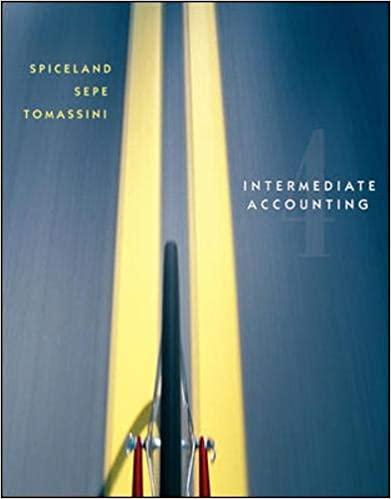Question
11. The ASC conceptual framework specifically mentions two underlying assumption. These are: (a) accrual and going concern (c) going concern and time period (b) accrual
11. The ASC conceptual framework specifically mentions two underlying assumption. These are:
(a) accrual and going concern (c) going concern and time period
(b) accrual and accounting entity (d) time period and monetary unit
12. The effects of transactions and other events are recognized when they occur and not as
cash or its equivalent is received or paid, and they are recorded and reported in the financial
statements of the period to which they relate.
(a) accrual (c) time period
(b) going concern (d) monetary unit
13. Which of the following statements is incorrect?
(a) The accrual method, which builds directly on the revenue and matching principles,
ignores the timing of cash receipts or payments when determining when to recognize
revenue or expenses.
(b) Expenses are matched with revenue, not the reverse.
(c) In accordance with the unit of measure assumption, accountants normally revise the
amounts to reflects the changing purchasing power of money due to inflation or
deflation.
(d) In accordance with the going concern assumption, the life of a business is presumed to
be indefinite.
14. If a business is not being sold or closed, the amounts reported in the accounts for assets
used in the business operations are based on the cost of the assets. This practice is justified
by:
(a) accrual (c) continuity assumption
(b) time period (d) accounting entity
15. John Frivs is the sole owner and manager of Ace Services. John purchased a car for
personal use. He uses a van in the business. Which of the following is violated if John
recorded the cost of the car as an asset of the business?
(a) conservatism (c) full disclosure
(b) going concern assumption (d) separate entity assumption
16. What is the traditional accounting period?
(a) three months (c) two years
(b) six months (d) twelve months
17. Which underlying concept serves as the basis for preparing financial statements at regular
intervals?
(a) accounting entity (c) accounting period
(b) going concern (d) stable monetary unit
18. Revenue is expressed as the number of pesos received or the peso equivalent of the
commodities of services received. Cost is expressed as the number of pesos paid out of the
peso equivalent of the items given up. Fluctuations in value of the peso are ignored. The
above describes what accounting assumption?
(a) going concern (c) historical cost
(b) unit of measure (d) realization
19. The financial statements should be stated in terms of a common financial denominator.
(a) accrual (c) time period
(b) going concern (d) monetary unit
20. The concept of accounting entity is applicable:
(a) only to be legal aspects of business organizations.
(b) only to the economic aspects of business organizations.
(c) only to business organizations.
(d) whenever accounting is involved.
Step by Step Solution
There are 3 Steps involved in it
Step: 1

Get Instant Access to Expert-Tailored Solutions
See step-by-step solutions with expert insights and AI powered tools for academic success
Step: 2

Step: 3

Ace Your Homework with AI
Get the answers you need in no time with our AI-driven, step-by-step assistance
Get Started


